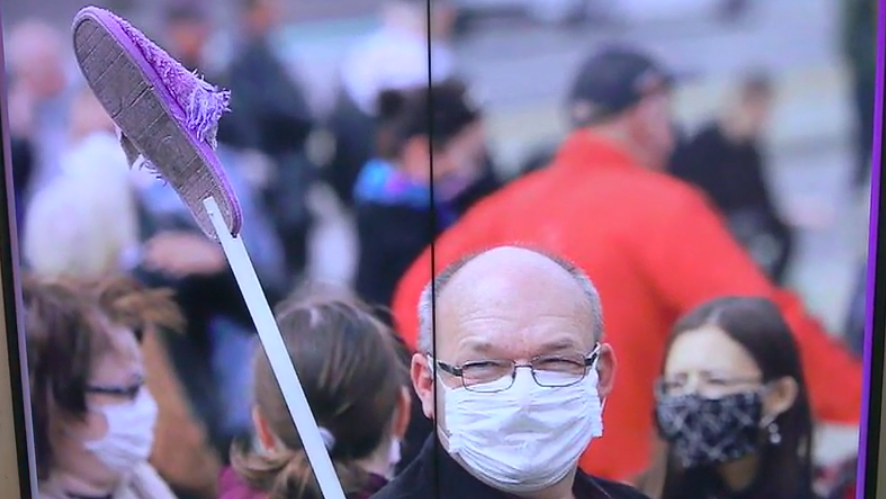
Screenshot Youtube
Belarusian President Alexander Lukashenko knows how to deal with the opposition, whether it is backed by certain Western structures, or by Russian oligarchic groups. The most efficient way for the Belarusian leader to win the presidential election scheduled for August 9 is to arrest key opposition candidates.
On June 18, Belarusian authorities detained Viktor Babariko, former head of the local unit of Russia’s Gazprombank and the top challenger in the upcoming presidential election. He was reportedly questioned over tax evasion and money laundering allegations. As a result, protests took place in more than ten cities all over the country. Reportedly, police in Minsk arrested dozens of protesters and journalist and shutdown the internet in order to prevent live-streaming. As expected, Belarusian security services were more than ready for any potential riots.
According to Ivan Tertel, the head of the State Control Committee, Babariko has allegedly embezzled $430 million from Belgazprombank accounts. It is worth noting that Tertel was appointed two weeks ago, and previously he worked as a deputy head of the KGB. The opposition, as well as some European politicians, claim that Babariko is a political prisoner and that Lukashenko is using security services as an instrument in order to pressure his opponents. Earlier this month, Belarusian security officials raided the local unit of Russia’s Gazprombank, and all transactions to and from Babariko’s electoral fund were blocked by the authorities, which was a clear indication that his arrest was just a matter of time.
Belarusian authorities, on the other hand, claim that the former banker has “skeletons in his closet”, which is apparently the main reason why he decided to run for president. Otherwise, according to Lukashenko, he would have been arrested. In any case, Babariko is behind bars, and some analysts believe that the Belarusian leader just waited for the right moment to detain the opposition politician and that way portray himself as the leader who mercilessly fights against corruption.
In the run-up to the election, Belarusian police have detained dozens of opposition activists, including popular vlogger Syarhey Tsikhanouski, as well as Nikolai Statkevich who was a presidential candidate in 2010. Both politicians have previously been banned from running. Although Lukashenko said that he wants to see Babariko nominated, it would not be improbable for the Central Election Commission to disqualify him over alleged tax evasion and money laundering. Yuri Gubarevich, the head of For Freedom movement, also has high chances of being banned from running as he was sentenced to 15 days in prison for “running a mass event”.
By arresting opposition candidates, Lukashenko clearly demonstrates his determination to stay in power at any price. Even though he would have won the election even if the opposition was allowed to participate, he does not seem to be willing to take a chance. Over the past 19 years, he never got less than 75 percent of the vote. There is speculations that his real approval ratings are much lower, which could be the reason why he aims to be seen as a “clear victor” on August 9. There are also theories that Babariko was backed by the Kremlin. However, Russian Foreign Minister Sergey Lavrov met with the Belarusian leader on June 19 in Minsk, which could be interpreted as clear Russian support for Lukashenko. Before the meeting, the Belarusian President reportedly held a phone call with his Russian counterpart Vladimir Putin, and the two leaders are scheduled to meet on June 24. Thus, Babariko was likely supported by certain Russian oligarchic groups, and the Kremlin used him as an instrument to put pressure on Lukashenko regarding energy deals, and the Russia – Belarus Union State integration plans.
It is worth noting that Western leaders remain relatively silent about the events in Belarus. Donald Tusk, former President of the European Council wrote on Twitter that “we (unclear who he had in mind) will not tolerate the unprecedented brutal behaviour of the Belarusian authorities”.
”Every day we hear about new arrests, unfair court trials, torture in prisons. It is time to act!””, wrote Tusk.
Apart from that, no harsh threats were posed to Belarusian authorities. Given the fact that Belarus started diversifying its energy supplies by importing oil and natural gas from countries such as Norway, Saudi Arabia and the United States, it is unlikely the West will put a serious pressure on Lukashenko, unless he suddenly decides to make concessions to Moscow regarding a deeper integration into the Russia-Belarus Union State.
For the Kremlin, Lukashenko is far from an ideal partner, but the elite that run Russia seem to favor the status quo, not just in Russia–Belarus relations, but elsewhere. That is why “better the devil you know than the devil you don’t” policy prevails when it comes to Lukashenko who will undoubtedly win his sixth presidential term.
- US Envoy To Balkans Richard Grenell Blames Kosovo-Serbia Land-Swap Idea On Former National Security Advisor John Bolton
- Has Trump Cut A Deal With Turkey? In Turnaround Ankara Now Proxy Force Against Russia, Iran

